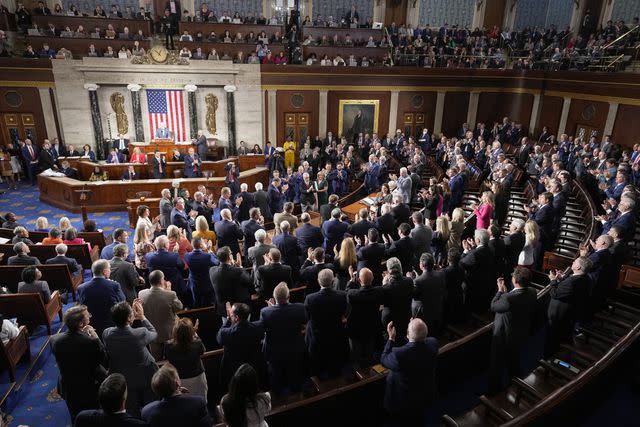How Mike Johnson, One of Congress' Staunchest Religious Conservatives, Became Second in Line to the President
He pushed a federal "Don't Say Gay" bill and denied the 2020 election results. Now, some say the newly elected House speaker from Louisiana could be one of the most extreme in recent history

SAUL LOEB/AFP via Getty
Mike JohnsonNew House Speaker Mike Johnson came into the role fairly easily, considering the tumult that engulfed the Republican Party in the weeks leading up to his election. But that doesn't mean his speakership will be without controversy.
Already, Democrats have voiced concerns that the little-known Louisiana congressman could be among the most extreme House speakers in recent history.
How Did Johnson Become House Speaker?
Johnson won the House speaker election on Wednesday afternoon in a 220-209 vote on party lines. But despite Republican's unanimous support for his bid, he was far from the party's first choice for speaker.
The recent chaos in Congress began when House Speaker Kevin McCarthy was ousted from the role in a first-of-its-kind recall on Oct. 3 that was initiated by far-right Florida Rep. Matt Gaetz.
After McCarthy's ouster, Republicans initially nominated Louisiana Rep. Steve Scalise to backfill his position, but the No. 2 House Republican quickly learned he would not have enough votes to win the formal speaker election on the House floor, and he withdrew himself from consideration for the role the following day.
Then, Ohio Rep. Jim Jordan was selected as the new Republican House speaker nominee. After three rounds of voting in the House speaker election, Jordan was also unable to secure the number of votes needed to win, and by Friday, his dreams of the speakership were dashed when members of his own party voted to drop him as the party's House speaker nominee.

Alex Brandon/AP Photo
House Republicans unite behind Mike Johnson at the House speaker election on Oct. 25, 2023After GOP members failed to unite behind its previous three speaker candidates, the party came together to support Johnson and put an end to the gridlock (which will allow Congress time to prevent a looming government shutdown on Nov. 17 and finally make some decisions on funding packages for Israel and Ukraine).
Prior to skipping the line and becoming the nation's third most powerful politician, Johnson had maintained a relatively low national profile. But behind the scenes, he's played an active role in shaping legislation aimed at eroding reproductive and LGBTQ rights.
Related: Mike Johnson Elected as the New House Speaker, Putting an End to Weeks of Gridlock

Elijah Nouvelage/Bloomberg via Getty
Louisiana Rep. Mike Johnson speaks during a panel discussion at the Conservative Political Action Conference on Feb. 28, 2021Johnson Previously Worked as a Lawyer for a Religious Group Behind Many Supreme Court Cases
Johnson's political positions are largely attributed to his ultraconservative religious views, which have led him to fight for prayer in public schools and lobby against abortion and same-sex marriage.
The Republican previously served as an attorney and spokesperson for the anti-LGBTQ group Alliance Defending Freedom, a religious organization that aims to further its agenda via the Supreme Court. The organization has played a key role in the passage of landmark cases, including 303 Creative LLC v. Elenis, which critics say allows businesses to discriminate against the LGBTQ community, and the reversal of Roe v. Wade last year.
During his time as an attorney for the group, Johnson penned a number of op-eds recently unearthed by CNN. In them, he accuses gay people of having "bizarre choices" which he writes aren't deserving of "special protections," and insinuates that homosexuality would lead to legalized pedophilia.
In one editorial written in 2004, Johnson espouses support for the Defense of Marriage Act, which banned the federal recognition of same-sex marriage until being found unconstitutional in 2015. De-emphasizing "traditional marriage," he wrote at the time, would "place our entire democratic system in jeopardy by eroding its foundation."
"Simply put, sex of any kind outside of the marriage of one man and one woman is ultimately destructive," he continued, later adding, "Homosexual relationships are inherently unnatural and, the studies clearly show, are ultimately harmful and costly for everyone." (Johnson didn't cite any scientific studies in the piece.)
He continued: "If we change marriage for this tiny, modern minority, we will have to do it for every deviant group. Polygamists, polyamorists, pedophiles, and others will be next in line to claim equal protection. They already are."
Never miss a story — sign up for PEOPLE's free daily newsletter to stay up-to-date on the best of what PEOPLE has to offer.
In another editorial highlighted by CNN, Johnson wrote that, “Your race, creed, and sex are what you are, while homosexuality and cross-dressing are things you do."
"This is a free country, but we don’t give special protections for every person’s bizarre choices," he added. In that editorial, he again wrote that homosexuality had been "proven to be destructive to individuals, to families, and to societies at large," though he did not attempt to offer proof of any of the above.

Al Drago/Bloomberg via Getty
Louisiana Rep. Mike Johnson outside of a House Republican Conference meeting on Oct. 24, 2023Johnson Brought His Religious Views and Defense of Trump to Congress
When Johnson was first elected to the House in 2016, he brought his socially conservative agenda with him, continuing to express disapproval of the landmark Supreme Court case Obergefell v. Hodges, which legalized same-sex marriage in 2015 and is supported by a record 71 percent of Americans.
In 2022, he introduced a bill aiming to ban mention of sexual orientation and gender identity in federally funded institutions. Called the Stop the Sexualization of Children Act, it was equated to Florida's controversial "Don't Say Gay" bill.
There are other controversies, too. Following the 2020 election, Johnson led an amicus brief on behalf of more than 100 Republican members of Congress in support of a lawsuit seeking to overturn the results in favor of Donald Trump in four swing states which he did not win. The brief was eventually thrown out by the Supreme Court.
When asked by a reporter on Tuesday about his alleged attempts to overturn the election for Trump, Johnson smiled, shook his head and said “next question.”
For more People news, make sure to sign up for our newsletter!
Read the original article on People.

